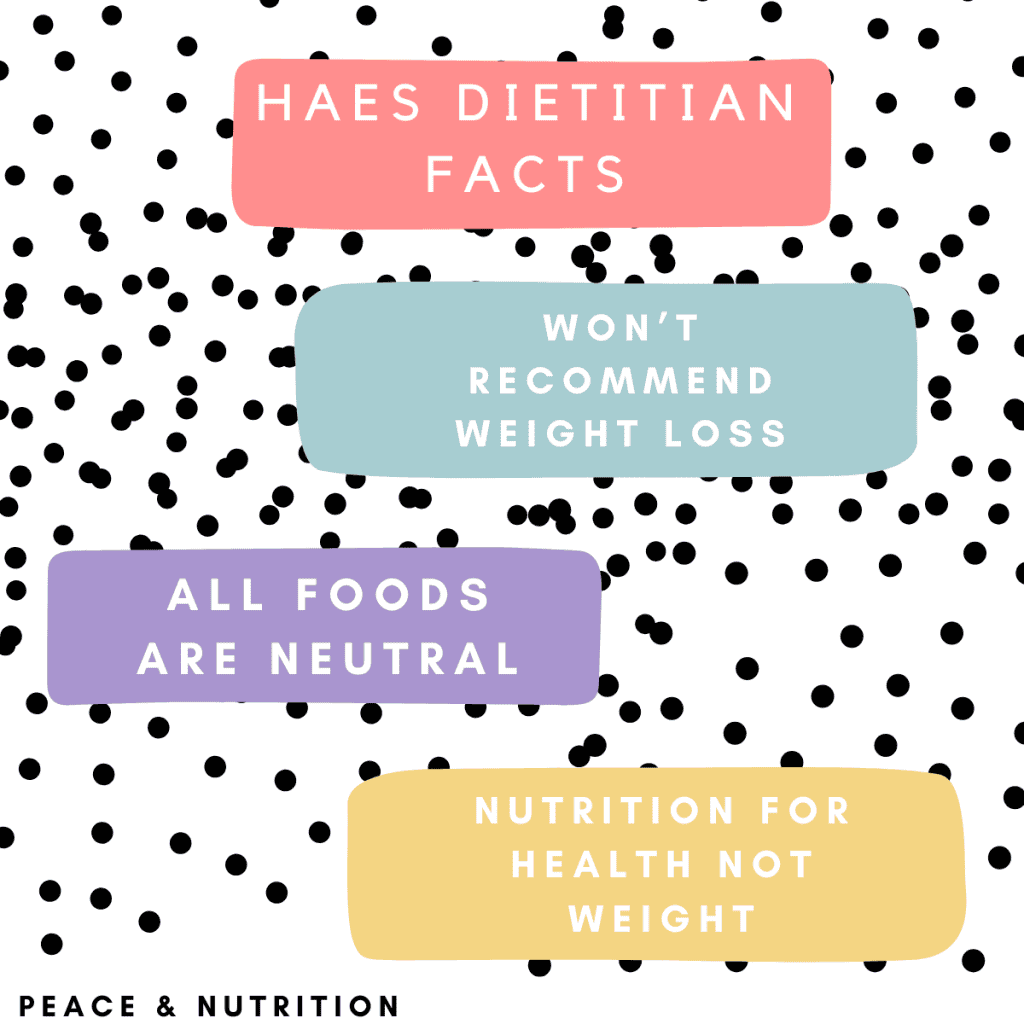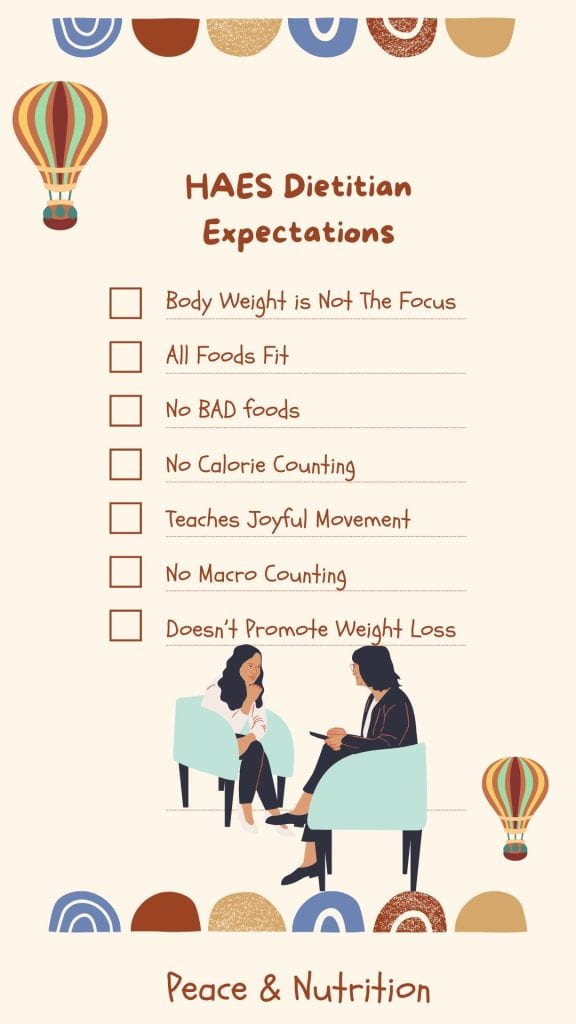Table of Contents
Last updated on September 14th, 2025 at 10:16 pm
non-diet dietitian also sometimes referred to as a HAES(health at every size) dietitian is a nutrition professional who helps clients improve their relationship with food and their bodies without focusing on weight loss as the primary goal. Instead of promoting restrictive meal plans or calorie counting, they use approaches like Intuitive Eating, mindful eating, and weight-neutral care to support overall health.
The goal is to move away from dieting culture, heal disordered eating patterns, and develop sustainable habits that honor hunger, fullness, and satisfaction. Non-diet dietitians often work with individuals recovering from eating disorders, chronic dieting, or body image struggles to foster a more compassionate and balanced approach to nutrition.
This article explores what you can expect when working with a non-diet rd, how a non diet dietitian is different from other healthcare provdiders, and the medical conditions that a non-diet RD can treat.

What is Non-Diet
A non-diet dietitian is a nutrition professional who helps people improve their health and relationship with food without using restrictive diets, calorie counting, or weight-focused goals. Instead, they focus on incorporating approaches like Intuitive Eating, mindful eating, and weight-neutral care. Non-diet dietitians still implement the lates scientific research and treatment modalities into their interventions- they simply do it without a focus on losing weight.
A few hallmarks the non-diet mentality is that it understands:
- Lower weights do not equal better health
- Diet culture and it’s obsession with thinness creates health disparities
- Clinical illnesses can be managed without nutrition intervention that includes weight loss
- Long term weight loss is not sustainable and will result in weight loss rebound for most people
Non-Diet Vs. Traditional Dietitian
A non-diet dietitian and a traditional dietitian differ significantly in their philosophies and approaches to nutrition. A non-diet dietitian focuses on helping clients build a healthy relationship with food, often using approaches like Intuitive Eating, mindful eating, and weight-neutral care. Their primary goal is to support overall well-being rather than weight loss, emphasizing body respect, food freedom, and sustainable habits without strict rules or calorie counting.
In contrast, a traditional dietitian often relies on structured meal plans, portion control, and calorie targets to guide clients toward measurable outcomes, such as weight loss or changes in BMI. While traditional dietitians may work with a wide range of nutrition needs, including medical conditions, non-diet dietitians frequently support individuals recovering from disordered eating, chronic dieting, or body image struggles, focusing on long-term health rather than short-term results.

Can You Lose Weight With A Non-Diet Dietitian
Yes.
The difference in non-diet healthcare and mainstream healthcare is that losing weight will never be the primary focus of the healthcare interaction. Non-diet dietitians do not subscribe to the fact that higher weights mean poor health. Instead, a non-diet RD will focus on any nutrition deficiencies or disturbances that might be impacting health. A HAES dietitian is focused on helping you make lifestyle choices to fuel the body and mind as well as manage any clinical conditions.
Once the principles of intuitive eating are established, you may or may not see weight changes. Your dietitian will support you in nourishing whatever nutrition habits align with your genetic blueprint for weight. A weight-inclusive RD also supports the idea that weights can change over time, and this is perfectly normal and healthy.
A non-diet RD will not:
- Prescribe weight loss as a focus to manage blood sugar but instead focus on how food impacts blood sugar at each meal
- Create weight loss strategies for managing high cholesterol
- Focus on weight loss as the intervention for joint pain

Are Non-Diet and Eating Disorder Dietitians The Same
All eating disorder dietitians typically practice from a non-diet approach, but not all non-diet dietitians are trained to treat eating disorders. Here are some of the key differences between haes/non-diet dietitians and eating disorder dietitians.
Non-Diet Dietitian
- Focuses on rejecting traditional dieting and weight-focused approaches.
- Uses methods like Intuitive Eating and weight-neutral care.
- Works with clients who want to improve their relationship with food, stop chronic dieting, or adopt a more mindful, balanced approach to nutrition.
- May or may not specialize in eating disorder treatment.
Eating Disorder Dietitian
- Specializes in supporting individuals recovering from eating disorders such as anorexia, bulimia, binge eating disorder, or ARFID.
- Trained to work within a multidisciplinary team (therapist, physician, etc.) to support medical, nutritional, and psychological recovery.
- Often uses non-diet principles but also provides structured meal support and guidance specific to recovery.

How Can A Non-Diet RD Help Me Improve My Health
Shaming people about their body weight in healthcare does not produce smaller bodies. It actually typically leads to poor compliance with medical visits, follow ups and the prescribed plan of care. The non-diet approach challenges weight stigma and biases that often lead to unequal care for people in larger bodies, marginalized communities, or those with a history of dieting and body shame. This can help clients feel safe about coming to session and motivate them to follow through with treatment plans. By recognizing that health can be pursued at different body sizes and respecting cultural, socioeconomic, and individual differences in food choices, HAES dietitians create a more inclusive healthcare environment where people feel safe, respected, and heard
A HAES dietitian will help you to:
- Manage medical conditions without weight bias
- Focus on how food choices can help manage clinical conditions without mandating weight loss
- Explore food neutrality to help you improve your relationship with food
- Identify and eliminate fear foods to reduce guilt and shame around eating
- Explore any body checking that might lead to body shame and food restriction
- Work through eating disorders or disordered eating behavior (where appropriate)
- Prescribe meal plans for allergies or intolerances
- Prescribe foods to help reduce inflammation
- Improve your mood through food
- Properly fuel your body for joyful movement without the goal weight loss
- Stop bingeing and restricting

Can I Use Insurance For a Non-Diet Dietitian
you can often use insurance to cover sessions with a non-diet dietitian, but coverage depends on your plan, the reason for your visit, and whether the dietitian is an in-network provider. Many insurance companies cover nutrition counseling, especially when it is related to a diagnosed medical condition such as diabetes, kidney disease, high cholesterol, or eating disorders. Many plans cover preventative nutrition visits and often are offered at no cost to the patient.
To confirm, you’ll need to contact your insurance provider and ask if they cover Medical Nutrition Therapy (MNT), how many visits are allowed each year, and whether you need a referral from your doctor. Additionally, make sure the dietitian is a Registered Dietitian Nutritionist (RDN) and listed as in-network for your plan to maximize benefits and reduce out-of-pocket costs.
© 2022 Peace and Nutrition
- Diet Culture is Toxic - December 22, 2025
- I Don’t Eat Anything White - December 11, 2025
- I Wish I Had More Control With Food - November 18, 2025